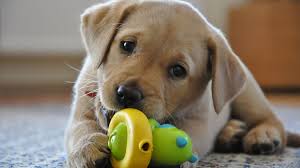I’ve received several calls over the last couple of weeks from people with new puppies who would like advice on puppy training.
Popular belief is that if we take our puppies to socialisation and training classes when they are young we will end up with a perfectly behaved, obedient companion, however this is not always the case …
Welcoming your puppy to your home
Taking a puppy away from his mother and litter and bringing him to your home can be a very traumatic experience. Give your puppy time to get used to your house and explore the new sights and sounds - everyone loves to fuss and cuddle a puppy but try not to overwhelm him by constantly giving him attention. Night time can be even more frightening! Up until 8 weeks old when he comes to live with you, your puppy will have spent every night with his mother and siblings – to suddenly be left alone in a strange environment on his own is likely to upset him. If possible sleep nearby for the first night or two until he has got used to his new environment.
Young children and puppies
I often look back to when we first had Harvey – by the time we brought him to our home he was 15 weeks old and had spent a Christmas living in a family with three young, excitable children. There had clearly been a lot of noise and excitement which had caused him a lot of stress. At this age fears can be imprinted in a dog that will remain with them for life so if your children start to get over excited take your puppy somewhere quiet where he can relax and get the sleep he needs to develop fully. Explain to your children that when he’s asleep your puppy needs to be left alone and teach them to always call him to them when they want to play with him – that way if he’s tired and wants to be left alone he’ll stay where he is.
Toilet training
Toilet training is one of the first things that people want to get right with their new puppy, but sadly there is still some confusion on the best way to do this. We would all like our dogs to toilet outside so start as soon as you get your new puppy home by taking him outside straight away. Give him time to sniff around and get used to his surroundings and when he toilets give him lots of praise and, if you want, a small piece of food to reward him and reinforce this as a positive experience. While he is young, and until he is fully toilet trained, always reward him when he toilets outside/in his designated spot and ignore the accidents in the home. This way he’ll learn that going outside gets him praise and reward and that he’ll get nothing if he goes in the wrong place!
Puppy Training: The best start for your puppy
Most people like to take their dogs to puppy classes, however some dogs find this a frightening and traumatic experience, and others can be bossy and over excited. Thinking this was the only way forward, we took Harvey to our local training classes for two years only to end up with a traumatised, badly behaved dog that barked at every dog he saw and who cowered at anything unexpected! Introducing Canine Communication to a young puppy is a perfect start for him as you will be communicating with him in a way he understands and he will learn quickly in his home environment where he will be feeling happy and relaxed with nothing to worry about.
Familiarising your Puppy:
Before he has been fully vaccinated carry your puppy in your arms and take him to areas with other people and dogs (but don’t take him right into the centre of a crowd – that would be far too frightening) so that he can get familiarised to lots of different sights and sounds. Start practicing lead-work in the house and teach your puppy where you would like him to walk praising him when he is walking calmly by your side. By the time he has had all his vaccinations he will trust and respect you and will know that it is safe to go out further afield with you.
The tips above cover just a few of the things you can do to help your puppy adjust into a carefree, well behaved adult dog. If you want to know more about Canine Communication and how it can help you and your puppy live happily together, please get in touch.

